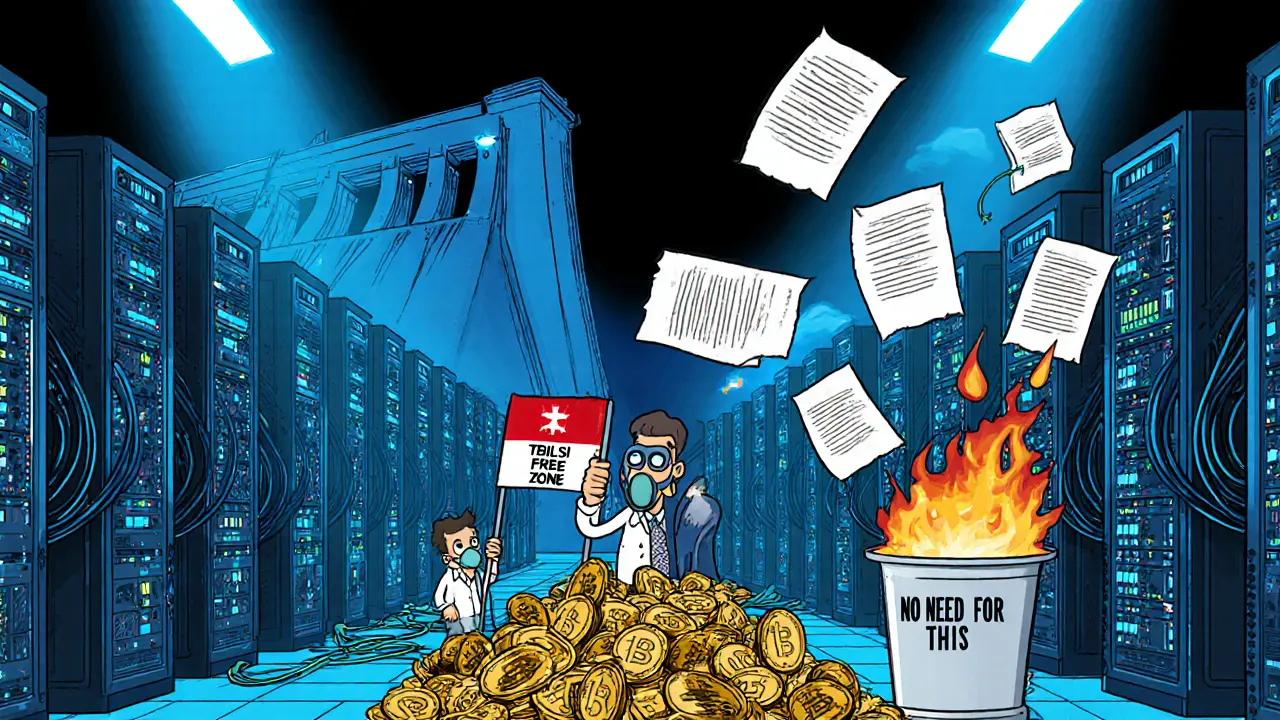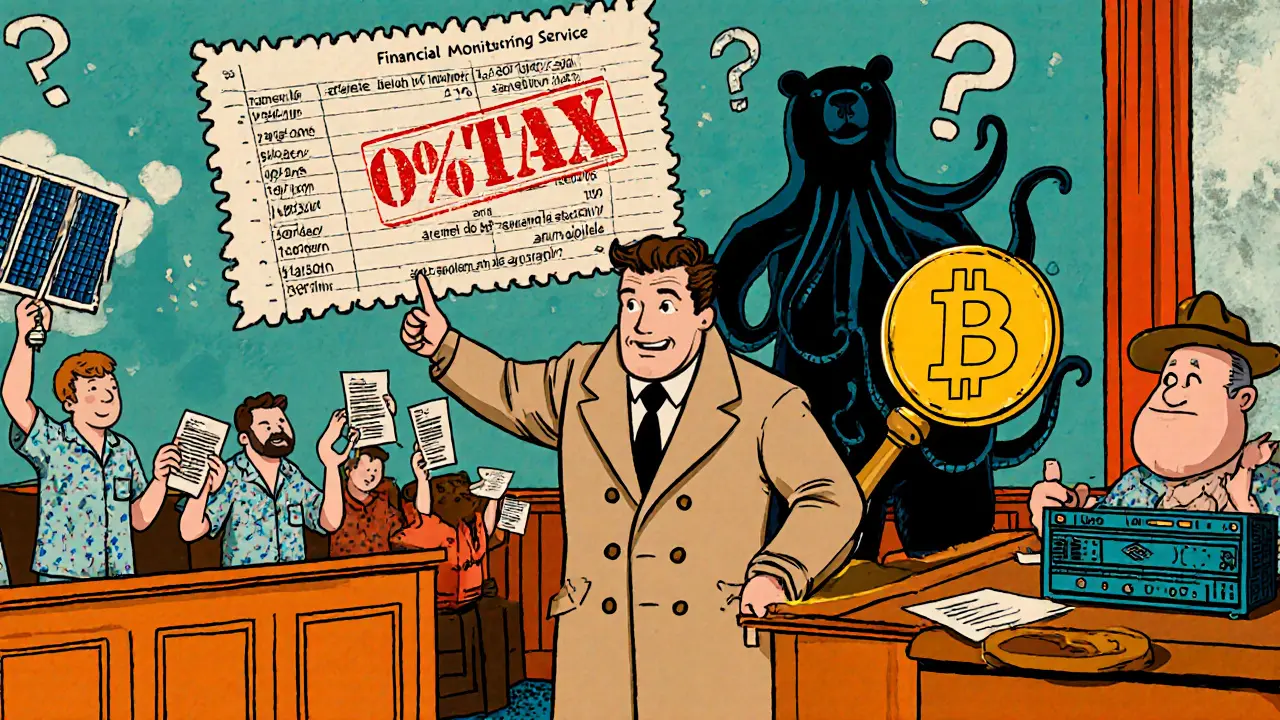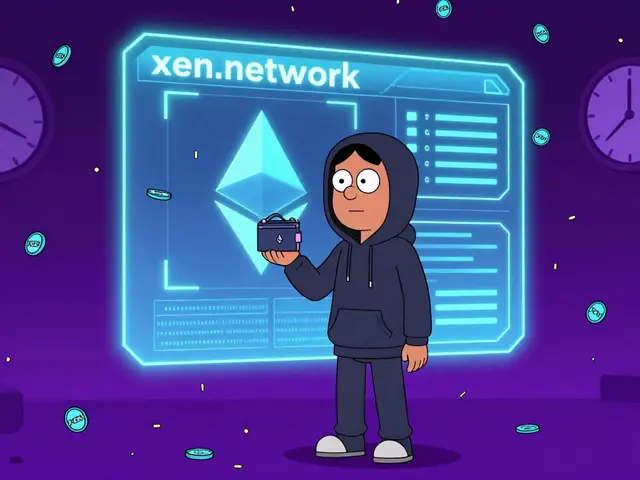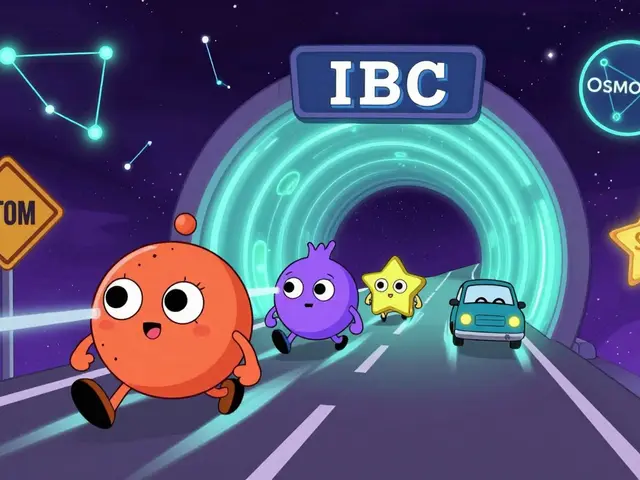Crypto Mining Cost Calculator
Compare electricity costs for crypto mining in Georgia versus other major mining regions. Georgia offers some of the lowest electricity rates globally at $0.03-0.05 per kWh.
Compared to USA:
You save $0.00 per month and $0.00 annually by mining in Georgia.
Georgia Mining Advantage
Georgia's hydroelectric power provides electricity at just $0.03-0.05 per kWh—about 60% cheaper than the US and 40% cheaper than China. The average winter temperatures (0°C) also reduce cooling costs by $15,000-$25,000 annually for a 100 kW operation.
Crypto mining in Georgia is legal-and getting easier
Georgia doesn’t just allow crypto mining; it actively invites it. As of 2025, the country is one of the top 10 mining hubs in the world, handling about 5% of global Bitcoin and Ethereum hash rate. That’s up from under 1% in 2019. Why? Because the rules are clear, taxes are near zero, and electricity is cheap. If you’re thinking about setting up a mining rig, Georgia might be the easiest place in Europe or Asia to do it legally.
Who needs a license? It depends on how big you are
Georgia draws a sharp line between individual miners and commercial operations. If you’re running one or two ASIC miners in your garage or basement, you don’t need a license. You don’t even need to report your earnings. Cryptocurrency mining income is treated as personal property, not taxable income. That means no capital gains tax, no income tax, no VAT. You keep 100% of what you mine.
But if you’re running 50 rigs or more, or you’re operating as a company, things change. You’re no longer an individual-you’re a business. And businesses must register under Georgia’s standard commercial laws. That means incorporating your company, opening a local bank account, and filing annual reports. But here’s the catch: there’s no specific mining license. Instead, you fall under the Virtual Asset Service Provider (VASP) framework.
The VASP license: What it really means for miners
The National Bank of Georgia (NBG) rolled out the VASP registration law in July 2023. It’s not a mining license-it’s a financial services license. If your operation involves holding, transferring, or trading crypto on behalf of others, you need it. But if you’re just mining and keeping the coins? You don’t need VASP registration… unless you’re selling them through a platform you control.
Most commercial miners avoid VASP registration by keeping mining and trading separate. They mine, then sell coins on international exchanges like Binance or Kraken. That keeps them outside the VASP scope. But if you want to offer wallet services, custody, or OTC trading to clients, then yes-you need to apply. The process includes submitting a business plan, proof of secure infrastructure, AML/CFT training records, and a cybersecurity audit. It takes 3-6 months and costs between $5,000 and $15,000 depending on your setup.

The Tbilisi Free Zone option: Tax-free mining for businesses
There’s another path: the Tbilisi Free Zone (FIZ). It’s not a separate country, but it might as well be. Located in the capital, the FIZ offers a fully offshore legal status for crypto businesses. Companies registered here pay 0% corporate tax, 0% VAT, and 0% dividend tax. They also get faster registration-sometimes under 30 days.
Many large mining farms use the FIZ structure. They incorporate a company in the zone, lease industrial space in Kutaisi or Batumi, run their rigs there, and keep profits offshore. The FIZ license doesn’t replace VASP-it complements it. You can have both: a FIZ company for tax efficiency and a VASP registration if you handle customer assets.
Costs for FIZ registration start at $2,000 for incorporation, plus $1,200/year in renewal fees. There’s no mandatory audit unless you’re handling client funds. For pure mining operations, this is the cheapest and cleanest route.
Energy costs: Why Georgia beats the rest
Electricity is the biggest cost in mining. In the U.S., it’s $0.12-$0.18 per kWh. In China, it’s gone up after crackdowns. In Georgia? It’s $0.03-$0.05 per kWh, and sometimes free in remote mountain areas.
How? Georgia has over 90% hydroelectric power. The country’s rivers and mountain dams produce more electricity than the population uses. That surplus gets sold cheaply to miners. The government doesn’t restrict energy use for crypto-it sees it as a way to monetize excess capacity.
Plus, Georgia’s climate helps. Average winter temperatures in Tbilisi hover around 0°C. That means you don’t need expensive cooling systems. Your ASICs run cooler, last longer, and use less power overall. A 100 kW mining farm in Georgia can save $15,000-$25,000 a year on cooling alone compared to a similar setup in Texas or Sweden.
Compliance: AML, KYC, and the Financial Monitoring Service
Georgia isn’t a free-for-all. The National Bank and its Financial Monitoring Service (FMS) are serious about stopping money laundering. All commercial crypto operators-whether VASP-registered or not-must follow basic AML/CFT rules if they interact with financial institutions.
That means: you must verify the identity of anyone you sell crypto to. You must log transaction amounts and timestamps. You must report suspicious activity. The FMS can request your mining logs, wallet addresses, and bank statements. They’ve done it before. In 2024, they shut down three unregistered operations that were laundering funds through fake mining companies.
But here’s the good news: if you’re transparent, you won’t have problems. The FMS doesn’t target honest miners. They target shell companies, mixers, and unlicensed exchanges. Keep clean records. Use reputable exchanges. Don’t accept cash payments from strangers. That’s it.

What’s changing in 2025 and beyond
The VASP framework is still being finalized. Full implementation is due by 2026. That means more reporting requirements, stricter KYC, and possibly mandatory use of licensed wallet providers. The government is also working on a digital ID system that could link crypto wallets to national IDs.
Energy policy might tighten too. There’s talk of capping mining usage at 3% of national consumption-currently it’s at 2%. But even if that happens, it’s still a massive buffer. Georgia’s grid can handle more. And the government has already said they’ll prioritize mining over residential use only in extreme shortages-which hasn’t happened since 2020.
One thing’s certain: Georgia won’t ban crypto. It’s too profitable. The country earned over $1.2 billion in crypto-related economic activity in 2024, mostly from mining and tech services. That’s more than its entire tourism revenue from Russia in 2019.
Where to set up: Tbilisi, Kutaisi, or the mountains?
Location matters. If you’re a solo miner with 5 rigs, a small town like Sighnaghi or Gori gives you cheap power and low rent. You can run off-grid with solar + battery backup.
For larger farms, Kutaisi is the sweet spot. It’s got industrial parks, fiber-optic internet, and direct access to hydro plants. Tbilisi is great for offices and compliance teams, but electricity is slightly more expensive. Batumi is emerging as a new hub thanks to its port and free trade zone status.
Most serious operators choose Kutaisi. It’s not the capital, but it’s the mining capital.
Bottom line: Georgia is still the best place to mine crypto
Forget the U.S. or Kazakhstan. Even though Canada and Iceland have cold weather, they don’t have zero taxes and cheap hydro. China banned mining. Russia tightened rules. Georgia doubled down.
If you’re an individual miner: just plug in. No paperwork. No taxes. Keep your coins. Sell when you want.
If you’re a business: register in the Tbilisi Free Zone. Keep your operations clean. Use reputable exchanges. Avoid mixing funds. You’ll have one of the cleanest, cheapest, and most stable crypto mining setups on the planet.
Georgia isn’t perfect. The internet can be spotty in rural areas. Bank accounts take time to open. But the rules are predictable. The incentives are real. And the government isn’t trying to scare you away-they’re handing you a key to the gold mine.
Do I need a license to mine crypto in Georgia as an individual?
No. Individual miners in Georgia do not need any license, registration, or permit. Mining income is treated as personal property, not taxable income. You can mine with one rig or 20, and as long as you’re not running a business or trading for others, you’re completely unregulated.
Is crypto mining taxed in Georgia?
No, not for individuals. There is no capital gains tax, income tax, or VAT on cryptocurrency mining earnings. For businesses, corporate income tax is 15% on profits-but only if you’re not registered in the Tbilisi Free Zone. FIZ companies pay 0% corporate tax. Electricity costs are also among the lowest in the world, making Georgia the most cost-effective mining jurisdiction globally.
What’s the difference between a VASP license and a Tbilisi Free Zone license?
A VASP license is required if you’re offering services like custody, trading, or wallet management to clients. It’s regulated by the National Bank of Georgia and involves strict AML/KYC rules. A Tbilisi Free Zone (FIZ) license is for businesses that want to operate offshore. It gives you 0% tax, faster setup, and no mandatory audits-unless you’re handling client assets. Many miners use FIZ for their company structure and avoid VASP entirely by selling mined coins on international exchanges.
Can I use solar power for mining in Georgia?
Yes. Many small-scale miners in mountainous regions use solar panels combined with battery storage. Georgia’s government doesn’t restrict off-grid mining. In fact, using renewable energy can help you avoid scrutiny from the Financial Monitoring Service, since it shows you’re not drawing from the national grid excessively. Some mining farms even sell surplus solar power back to local communities.
How long does it take to set up a crypto mining business in Georgia?
For individuals: immediately. Just buy equipment and plug it in. For businesses: 2-4 weeks if you use the Tbilisi Free Zone. You’ll need to incorporate, open a bank account, and get a business address. VASP registration takes longer-3 to 6 months-because of audits and compliance checks. Most miners skip VASP unless they’re offering financial services.
Is Georgia’s crypto mining legal under international standards?
Yes. Georgia follows FATF guidelines and has implemented the EU’s 5th Anti-Money Laundering Directive through its VASP law. The IMF praised Georgia’s regulatory framework in March 2024 for balancing innovation with compliance. As long as you follow AML rules and avoid illicit activity, your mining operation is fully compliant with global standards.
What happens if I don’t comply with Georgia’s crypto rules?
If you’re an individual miner, nothing. The government doesn’t track personal mining. If you’re a business and you ignore AML/KYC rules, the Financial Monitoring Service can freeze your bank account, shut down your operation, and fine you up to $50,000. In extreme cases, criminal charges apply-for example, if you’re laundering money through fake mining rigs. But honest operators have nothing to fear.






Michael Brooks
Honestly, Georgia is the only place that makes sense for mining right now. Cheap power, zero taxes, and the government isn't trying to screw you over. I've looked at Canada, Iceland, even Kazakhstan-none of them come close. Just plug in and go. No paperwork, no headaches.